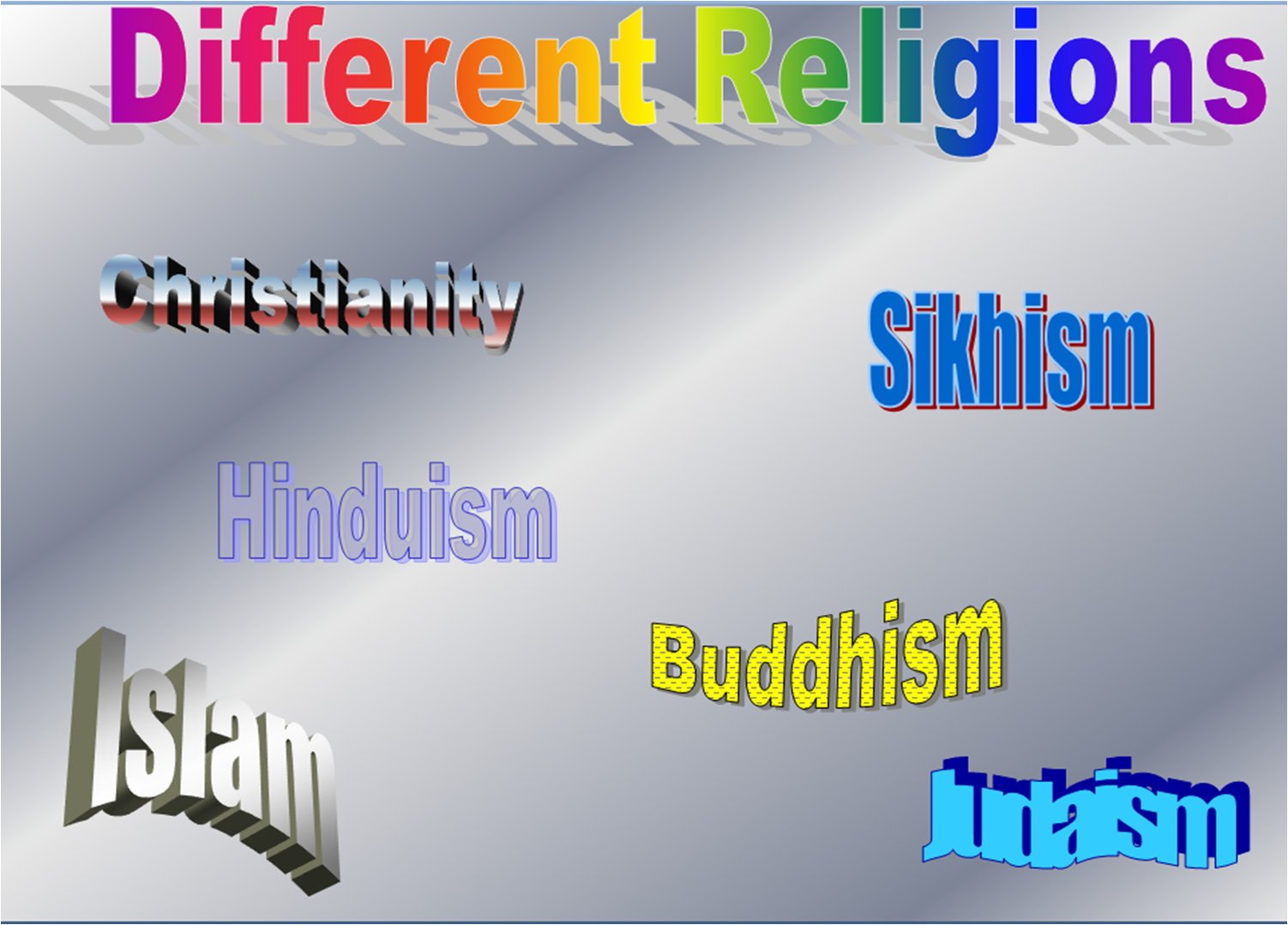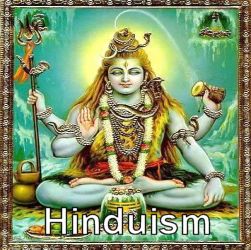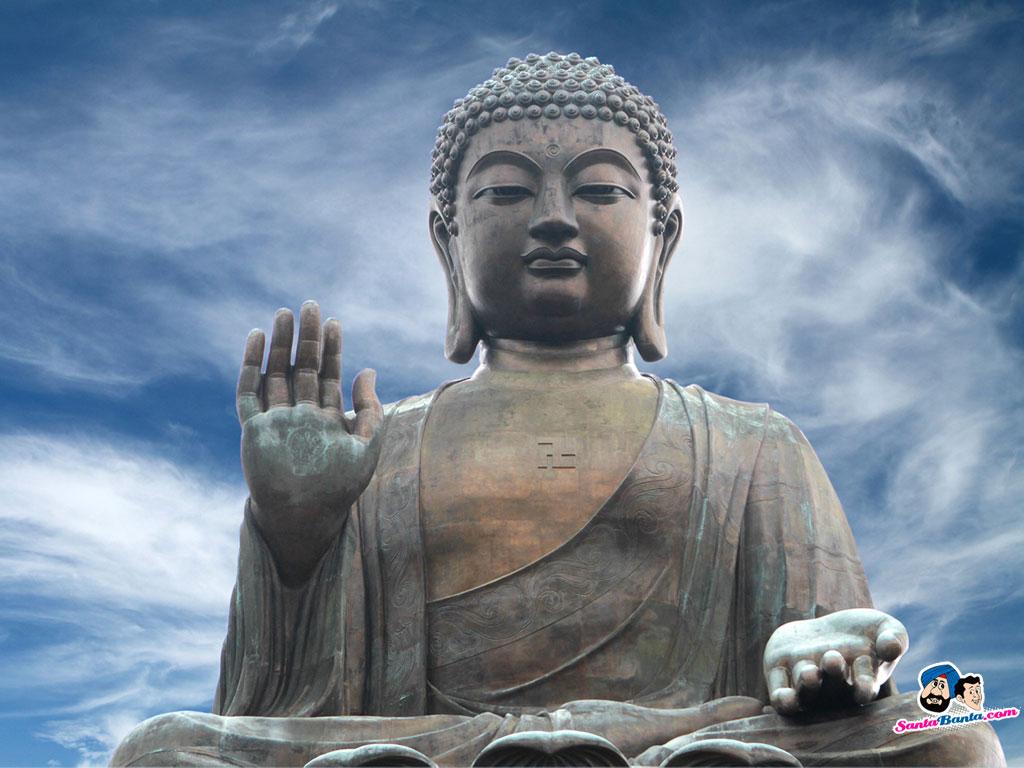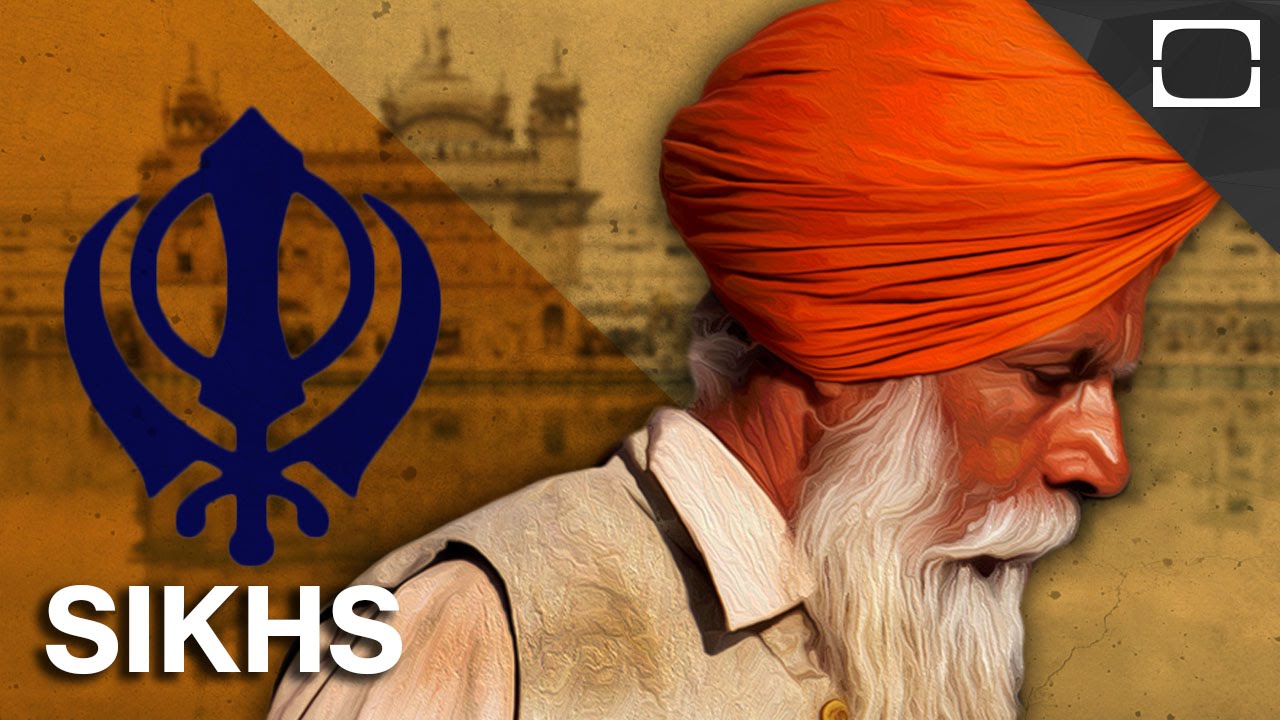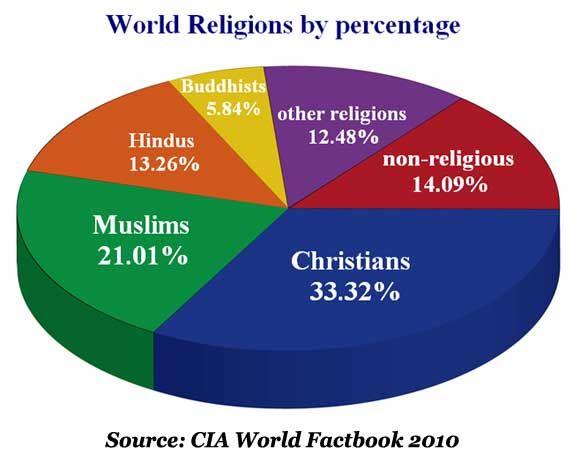There are over 42,000 different religions in the world. Here is a list of some of the most prevalent religions and some of the religions many people have probably never heard of.
There are over 2.2 billion Christians in the world. The religion is about following the teachings of Jesus. The followers believe that there is only one god, but with 3 different persons--The Father, The Son and The Holy spirit. It is called the Mystery of the Holy Trinity, basically because it is difficult if not impossible to explain. The largest number of Christians out over 30,000 different denominations in Christianity are Roman Catholics, comprising of over 1.2 billion people. The Bible is their holy book which contains the teachings of Jesus in what is called the New Testament.
The second largest religion in the world is Islam, with over 1.6 billion people known as Muslims who follow the teaching of the prophet Muhammad. The word Islam means voluntary “Submission” or “Surrender” to the Will of God. It derives from the root word “salam,” meaning peace. They believe in one god or Allah as the creator of everything. The teachings of their prophet is found in their holy book called the Quran. Islam is the fastest growing religion in the world.
Out of the 3 religions that worship the god of Abraham (the other 2 are Christianity and Islam), Judaism is the oldest. Judaism is an ancient monotheistic religion, with the Torah as its foundational text (part of the larger text known as the Tanakh or Hebrew Bible). Christians use part of the Torah in their Bible known as the Old Testament. Their are around 16 million Jews in the world.
There around 1 billion Hindus in the world and Hinduism is considered the oldest organized religion in the world. There was no one person that began this religion as it developed from the religion that the Aryans brought to India with them in about 1500 BC. Hindus believe that all living creatures have a soul and the soul is eternal. As far as their scriptures are concerned, they include the Vedas, the Upanishads, the Bhagavad Gita and Agamas. It has been said that Hindus worship over 300 million gods. To give a detailed description on their belief in god(s) is a challenge for a short format, but simply put, the main belief of Hinduism is in one almighty being that exists in everything, who is credited with the creation of reality. This existence of reality is known as Brahman, and all of the gods that Hindus worship exist in Brahman Hindus have four central tenants: Dharma, or fulfilling one's purpose; Artha, or prosperity; Kama, or desire, sexuality, enjoyment; and Moksha, or enlightenment. The ideal goal of a Hindu life is to seek these four goals. Hindus also believe that no one religion teaches the only path to salvation, and that all are simply facets of god and the universe.
It can be debated if Buddhism is a religion or a philosophy, but as Buddha said when asked what it was, he said that what he teaches is "the way things are." He said nobody should believe his teachings out of faith, but instead they should examine for themselves to see if they are true or not. There is an estimated 490 to 500 million Buddhists in the world. Buddhism does not include the idea of worshiping a creator god. The best definition for Buddhism is, a path of practice and spiritual development leading to the insight of the true nature of reality. Buddhism was founded in India in the late 6th century B.C.E. by Siddhartha Gautama, who was known as the Buddha. Through the teachings of Buddha, the ultimate goal is the attainment of the state of nirvana, a spiritual existence where one has escaped the cycle of birth and death. Those that see this as a religion, say it is the most peaceful.
With over 20 million followers, Sikhism it is the 5th largest religion in the world. It has been mistaken to be an offshoot of Islam and Hinduism. Sikhism is based on the spiritual teachings of Guru Nanak. The basis of Sikhism lies in the teachings of Guru Nanak and his successors. The essence of Sikh teaching is simplified by Guru Nanak's words: "Realization of Truth is higher than all else. God in Sikhism is known as Ik Onkar. One of the main differences in this religion is that in its writings, not only did their god create everything including life here on earth, but also created life on many other worlds. The religion rejects all forms of discrimination. It is through meditation and good works that one becomes closer to their god and a heavenly life.
Nearly 8 million people subscribe to the Bahá'í faith. The Bahá'í Faith was founded by Bahá'u'lláh in 19th-century Persia. In the Bahá'í Faith, it uses the idea of messengers from god These messengers have included Abraham, Moses, Jesus, Muhammad, as well as figures from Indian religions like Krishna, Buddha, and others. The Bahá'í religion is a monotheistic religion which emphasizes the spiritual unity of all humans. Three core principles establish a basis for Bahá'í teachings and doctrine: the unity of God, that there is only one God who is the source of all creation; the unity of religion, that all major religions have the same spiritual source and come from the same God; and the unity of humanity, that all humans have been created equal, coupled with the unity in diversity, that diversity of race and culture are seen as worthy of appreciation and acceptance. According to the Bahá'í Faith's teachings, the human purpose is to learn to know and to love God through such methods as prayer, reflection and being of service to humanity. Between 1910 and 2010 it was the one of the fastest growing religions as the general population. According to The World Almanac and Book of Facts 2004:The majority of Bahá'ís live in Asia (3.6 million), Africa (1.8 million), and Latin America (900,000). According to some estimates, the largest Bahá'í community in the world is in India, with 2.2 million Bahá'ís, next is Iran, with 350,000, the US, with 150,000, and Brazil, with 60,000. Aside from these countries, numbers vary greatly. Currently, no country has a Bahá'í majority.
Confucius (551–479 BCE) is the founder of Confucianism and as with Buddhism, it is can be debated if it is a religion or philosophical way to explain and help others in life. It focuses on family and social well being. Around 6 and a half million people follow Confucianism. Unlike Christianity, Confucius taught that man is capable of doing all that is necessary to improve his life and his culture, relying on the virtue within himself to accomplish it. That man is initially good, but needs help along his journey in life. While there is no central god in this ideology, it has what is known as Tian, or a concept of a heaven that has a relationship with Earth and life. Confucianism focuses mainly on the physical life, but Confucius clearly believed in some form of spiritual survival. This is why reverence to ancestors plays an important part in Confucianism. Confucius was convinced that human beings understood far too little of life here and now to waste it planning for a hereafter they understood even less. When classical Confucian sources talk about Heaven, therefore, they do not have in mind anything like a realm of eternal reward for those who die in a state of righteousness. Heaven is merely a name for the highest spiritual presence of which human beings are aware. We still read his sayings and no matter what religion, or no religion one belongs to, these words can also be applied to our lives.
Shintoism is followed by nearly 3 million people and is the largest religion in Japan. Shintoism has been influenced by Confucianism and by Buddhism, which was introduced in Japan in the 6th century and has no formal dogma and no holy writ. The essence of Shinto is the Japanese devotion to invisible spiritual beings and powers called kami. Unlike Buddhism and Confucianism, Shinto is not a way of explaining the world. What matters are rituals that enable human beings to communicate with kami. Kami are not God or gods. They are spirits that are concerned with human beings. However, Kami include gods. It is a peaceful religion.
Here is a pie chart of the percentages of the people in different religions. There are many people that still believe in a god, but do not subscribe to any particular religion. These people are included with atheists and agnostics.





